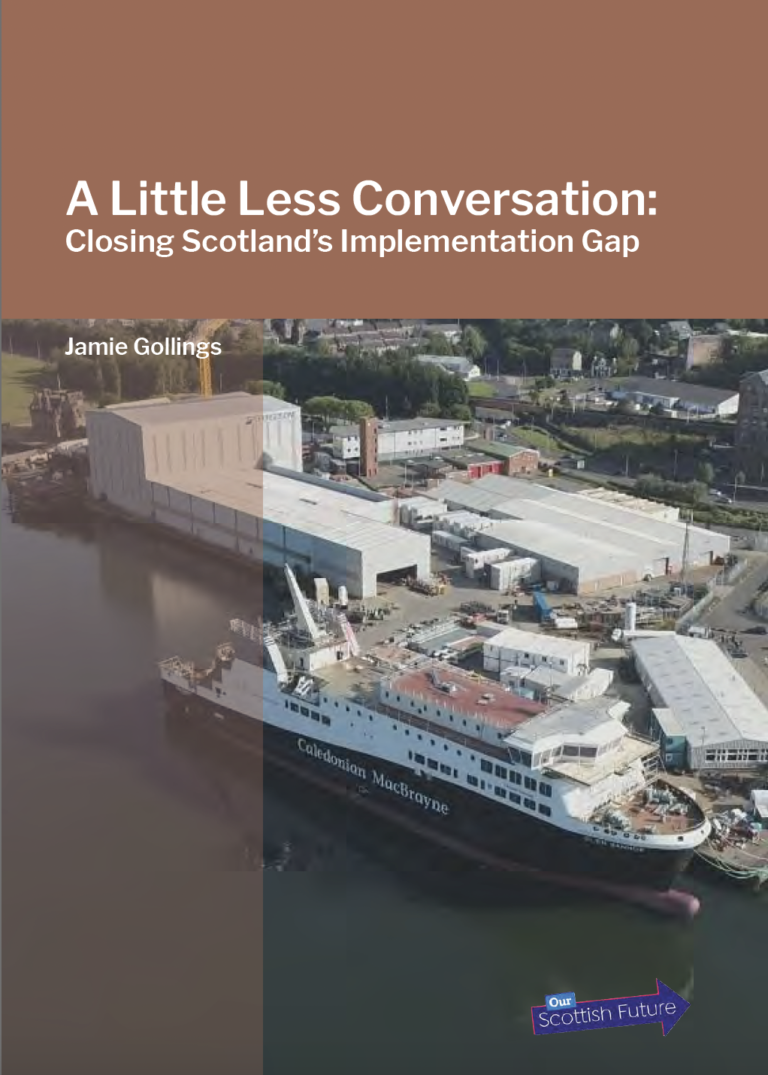Scotland’s political parties must find a way to push past the country’s short-term constitutional fight if much-needed long-term policy reforms are to be implemented, a major report by Our Scottish Future declares today.
The 100-page report – entitled “A Little Less Conversation: How to Fix Scotland’s Implementation Gap” – argues that the successes of devolution has been stymied in recent years by a combination of “too much politics, too much government, a failure to cooperate, and a centralised political culture”.
It praises several successes under the Scottish Government but concludes that Ministers too often “govern by press release”.
Pointing to the problem of “consultitis”, the report finds that the Edinburgh administration has published nearly 700 consultation papers and 529 strategies or plans since the 2014 independence referendum. That works out at more than one strategy or plan being published every week.
Written by OSF research and policy director Jamie Gollings, the report recommends a series of reforms to boost implementation of policy in Scotland including a cap on the number of ministers, increased powers for Scottish Parliament committees, a new Scottish Government delivery unit, and greater decentralisation of power across Scotland.
The report concludes: “We have, collectively, lacked the focus and the courage to follow through on the policy choices we say we want to make. The constitutional divide has not just distracted us from this task; it has been a useful tool to put off the hard decisions our politicians must know need to be made.”
“The measures we suggest would go some way to closing the implementation gap. The most powerful thing, though, would be a generation of leaders determined to change Scotland’s political culture from one that prizes big talk to one that prizes bigger actions.”
Chair of OSF Professor Jim Gallagher commented today: “ Government isn’t just about making speeches and publishing strategies, but implementing policies and delivering change. Scotland’s political culture has become one in which speeches are made, glossy documents are published, but too many things simply don’t get done. The first step to changing this problem is admitting that we have one.”
Today’s report is based on a series of interviews with political and civic leaders over recent months, together with analysis of more than 100 Scottish Government initiatives undertaken over the last decade.
The report sought to examine specific areas where implementation of policy initiatives had fallen short and to draw conclusions as to the common reasons why.
It follows a Health Foundation report earlier this year which concluded that efforts to reduce health inequalities suffered from an “implementation gap’, with more than 80% of its own interviewees agreeing it was a serious problem.
OSF’s research concluded that core reasons for the failure to deliver in Scotland centred on:
· Short-term decision-making, exacerbated by Scotland’s constitutional and political “high-alert” since the 2014 referendum.
· A top-heavy and cluttered governing operating system, prizing announcements over delivery
· A lack of cooperation both within Scotland and between Scotland and the rest of the UK
· Over-centralisation and a lack of trust between the centre and local/regional government.
The report concludes that implementation of policy can be improved through a more focussed government machine, a stronger Scottish parliament, more cooperation between governments, and greater decentralisation of power out of Edinburgh. Specific recommendations include:
· a cap on the number of government ministers so there are enough MSPs to properly scrutinise delivery of policy and to encourage greater focus within the Scottish Government.
· A new First Minister’s Delivery Unit plus a new Parliamentary Future Generations Commissioner to focus on Scotland’s long-term challenges
· A regular five yearly parliamentary review of all Scottish quangos to examine their responsibilities, plus a drive to bring in more external candidates to the civil service.
· A shift of power out of Edinburgh to new regional layers of government plus new “institutions of cooperation” between UK and Scottish Governments.
· A boosted role for committee convenors including a specific salary on top of MSPs pay.
Examining the increase in the amount of publications published by the Scottish Government, the report also includes an annexe listing the total number since the 2014 independence referendum.
Of the total 529 strategies and plans, there were 113 relating to the health and care system, 60 on the economy, and no fewer than 82 on climate change.
In addition, a further 669 Scottish Government consultations were also published over the same time frame.
The report notes the success of several high-profile policy decisions in Scotland and singles out the construction of the Queensferry Crossing, the Patient Safety Programme combating hospital acquired infections and the creation of a new National Manufacturing Institute in Renfrewshire.
The specific policy areas examined where implementation has fallen short include Curriculum for Excellence, the Scottish Attainment Challenge, the construction of two new CalMac ferries, the roll out of the Scottish census, commitments on net zero, the delivery of The Promise to looked after children, and fully meeting targets to construct new housing in Scotland.
Concluding the report, Gollings says that the key responsibility lies with political leaders to show leadership on the constitutional question. “It would take real leadership, but the current First Minister and opposition leaders could turn away from the ‘rolling campaign’ and focus instead on how to make things in Scotland work better. They can then start to recapture the initial ideals of the devolution project,” he says.
Read the report here









